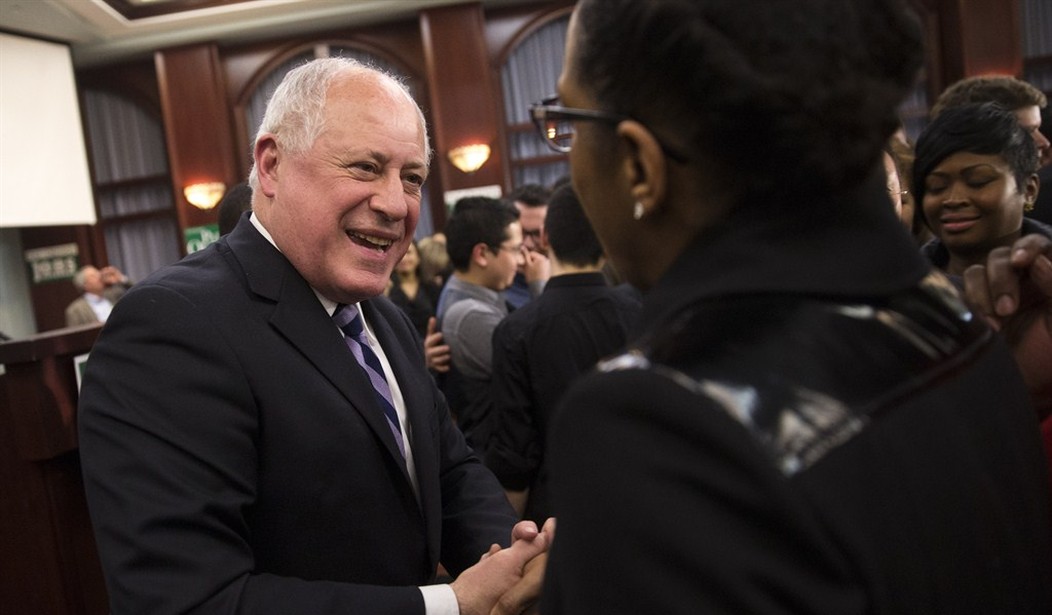Government of, by and for the people.
Yeah, right.
If government were “of, by and for” us — as President Lincoln spoke so eloquently over the fallen at Gettysburg — well, for starters, we’d have term limits.
Especially in Illinois. The Land of Lincoln has sadly become the nation’s capital of corruption. Four of the last seven governors left their “service” in the governor’s mansion to serve time in prison. After former Governor Rod Blagojevich was indicted for selling a U.S. Senate seat to the highest bidder, the head of the FBI’s Chicago office quipped that if Illinois “isn’t the most corrupt state in the United States, it’s certainly one hell of a competitor."
The state’s most dominant politician, however, isn’t the governor. It’s House Speaker Michael Madigan, the longest-serving speaker in state history, having wielded power as legislative top banana for 29 of the last 31 years.
Over the last five, The Chicago Tribune has perennially published features on how Speaker Madigan “wields clout to help friends and allies, benefit his legal clients and maintain his decades-long grip on state government.” The series, called “The Madigan Rules,” boasts headlines, including: “Favorable legislation flows to private clients of House Speaker Madigan,” “How Madigan builds his patronage army,” “Madigan’s allies get slice of village business,” and “Madigan’s son’s employer rakes in suburbs’ insurance business.”
You get the idea.
One public employee discussed a phone call from the Speaker asking him to give an employee a raise. “I didn’t feel like he was putting a gun to me, but,” said the former Metropolitan Pier and Exposition Authority chief, “then again, he is the speaker of the House . . . who to a great extent controlled our legislation and funding.”
Recommended
“Madigan clearly has so much power he has made himself impregnable,” according to James Browning, with the liberal watchdog group Common Cause. “How do you push back when one man has amassed so much control?"
Yes, Mr. Madigan is very, very, very powerful.
But not at all popular. Polls show the long-serving, patronage-spewing speaker is rated negatively by a whopping 65 percent of the public.
Last week, almost like Spring breaking up the long, cold winter, the oppressive negativity of Illinois politics was met quite positively — and head-on. The Committee for Legislative Reform and Term Limits delivered to the state Board of Elections a 36-foot long box, weighing nearly two tons, filled with 68,000 pages of petitions containing nearly 600,000 signatures from state voters.
That’s more than enough signatures to place the constitutional amendment onto this November’s ballot. The measure will limit state legislators to eight years in office. It will also reduce the size of the state senate (from 59 to 41) and increase the size of the state house (from 118 to 123), while increasing the legislative vote needed to override a governor’s veto to the same two-thirds threshold found in 37 other states and at the federal level, for the president.
Under Illinois’s limited initiative process, only legislators can be term-limited, but the issue promises to animate the governor’s race as well. Republican nominee for governor, Bruce Rauner, led the campaign to place the issue on the ballot.
“We are taking the term limits initiative to the voters directly,” he said at the news conference announcing that nearly 600,000 voters had signed. “Serve the voters and then leave office.” A successful businessman, Rauner has not previously sought public office.
Meanwhile, incumbent Democratic Governor Pat Quinn is no term limits slouch, either. He led a 1994 petition effort to impose legislative term limits, later blocked in court. Quinn announced prior to the current massive signature submission that he would abide by self-imposed term limits, meaning the second full term he now seeks would be his last. (Quinn picked up a partial term at the start of his gubernatorial stretch when police removed his predecessor, thus creating a vacancy.)
One man has definitely not jumped on the term limits bandwagon. Just hours before all those voter signatures were presented to state officials, an attorney connected to Speaker Madigan filed a lawsuit hoping to block the vote.
In 1994, when now-Governor Quinn and others petitioned a straight term limits question onto the ballot, the Illinois Supreme Court blocked it for not being both “structural and procedural.” The current proposal addresses this ostensible requirement by offering more than term limits: it would change the number of state senators and reps and also raises the threshold to override a governor’s veto from the current 60 percent to 67 percent. As Trib columnist Eric Zorn points out: “one clearly procedural, the other clearly structural.”
Predicting how judges will rule is the very inexact-est science of all, but all democratic hope lies with the voters of Illinois having the opportunity to decide — yes, for the decision simply to be “by the people.”
It’s certainly educational that the news report on the Madigan-inspired lawsuit quoted “sources who asked not to be identified for fear of risking their ability to secure state grant dollars.”
Yet another argument for term limits.
Now. More than ever.

























Join the conversation as a VIP Member